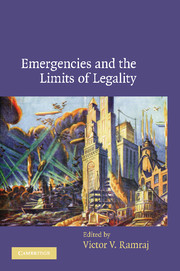Book contents
- Frontmatter
- Contents
- List of contributors
- Preface
- Introduction
- PART ONE Legality and extra-legality
- PART TWO Conceptual and normative theories
- PART THREE Political and sociological theories
- PART FOUR Prospective constraints on state power
- 9 Emergency strategies for prescriptive legal positivists: anti-terrorist law and legal theory
- 10 The ordinary law of emergencies and democratic derogation from rights
- 11 Presidentialism and emergency government
- PART FIVE Judicial responses to official disobedience
- PART SIX Post-colonial and international perspectives
- Index
- References
10 - The ordinary law of emergencies and democratic derogation from rights
Published online by Cambridge University Press: 10 August 2009
- Frontmatter
- Contents
- List of contributors
- Preface
- Introduction
- PART ONE Legality and extra-legality
- PART TWO Conceptual and normative theories
- PART THREE Political and sociological theories
- PART FOUR Prospective constraints on state power
- 9 Emergency strategies for prescriptive legal positivists: anti-terrorist law and legal theory
- 10 The ordinary law of emergencies and democratic derogation from rights
- 11 Presidentialism and emergency government
- PART FIVE Judicial responses to official disobedience
- PART SIX Post-colonial and international perspectives
- Index
- References
Summary
Introduction
The post-9/11 scholarly debate on emergency powers as represented by the debate between David Dyzenhaus and Oren Gross over legality and extra-legal powers has defined the concept of emergency narrowly in relation to the detention or disruption of suspected terrorists or enemies. This understanding of emergencies is dramatically under-inclusive. It ignores genuine emergencies such as Hurricane Katrina, the Asian tsunami and pandemics, as well as the need for recovery after particularly disruptive acts of terrorism. Although cloaked in the rhetorical urgency of emergencies, the post-9/11 debate about emergencies has been about the treatment of the rights of suspected terrorists, not about how a state will respond to the full range of emergencies that modern society will face.
Although I am sceptical about whether the post-9/11 debate is really about emergencies, I am not sceptical about the fact that modern society will confront genuine emergencies. Such emergencies will require the state to engage in extraordinary measures that may have adverse effects on rights. Modern states have recognised the reality of emergencies and have enacted framework statutes to enable the state to deal with emergencies. To this end, we should be concerned about the ordinary law that governs all emergencies. In contrast to the mountains of work that have been devoted to anti-terrorism measures, emergency laws in Canada, the United Kingdom and the United States have attracted comparatively scant scholarly attention.
- Type
- Chapter
- Information
- Emergencies and the Limits of Legality , pp. 229 - 257Publisher: Cambridge University PressPrint publication year: 2008
References
- 5
- Cited by



